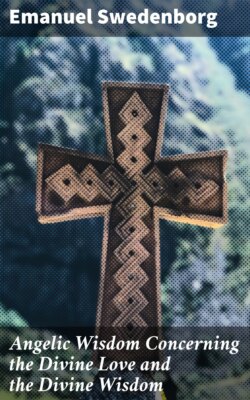Читать книгу Angelic Wisdom Concerning the Divine Love and the Divine Wisdom - Emanuel Swedenborg - Страница 12
На сайте Литреса книга снята с продажи.
40. DIVINE LOVE AND DIVINE WISDOM ARE SUBSTANCE AND ARE FORM.
ОглавлениеThe idea of men in general about love and about wisdom is that they are like something hovering and floating in thin air or ether or like what exhales from something of this kind. Scarcely any one believes that they are really and actually substance and form. Even those who recognize that they are substance and form still think of the love and the wisdom as outside the subject and as issuing from it. For they call substance and form that which they think of as outside the subject and as issuing from it, even though it be something hovering and floating; not knowing that love and wisdom are the subject itself, and that what is perceived outside of it and as hovering and floating is nothing but an appearance of the state of the subject in itself. There are several reasons why this has not hitherto been seen, one of which is, that appearances are the first things out of which the human mind forms its understanding, and these appearances the mind can shake off only by the exploration of the cause; and if the cause lies deeply hidden, the mind can explore it only by keeping the understanding for a long time in spiritual light; and this it cannot do by reason of the natural light which continually withdraws it. The truth is, however, that love and wisdom are the real and actual substance and form that constitute the subject itself.
41. But as this is contrary to appearance, it may seem not to merit belief unless it be proved; and since it can be proved only by such things as man can apprehend by his bodily senses, by these it shall be proved. Man has five external senses, called touch, taste, smell, hearing and sight. The subject of touch is the skin by which man is enveloped, the very substance and form of the skin causing it to feel whatever is applied to it. The sense of touch is not in the things applied, but in the substance and form of the skin, which are the subject; the sense itself is nothing but an affecting of the subject by the things applied. It is the same with taste; this sense is only an affecting of the substance and form of the tongue; the tongue is the subject. It is the same with smell; it is well known that odor affects the nostrils, and that it is in the nostrils, and that the nostrils are affected by the odoriferous particles touching them. It is the same with hearing, which seems to be in the place where the sound originates; but the hearing is in the ear, and is an affecting of its substance and form; that the hearing is at a distance from the ear is an appearance. It is the same with sight. When a man sees objects at a distance, the seeing appears to be there; yet the seeing is in the eye, which is the subject, and is likewise an affecting of the subject. Distance is solely from the judgment concluding about space from things intermediate, or from the diminution and consequent indistinctness of the object, an image of which is produced interiorly in the eye according to the angle of incidence. From this it is evident that sight does not go out from the eye to the object, but that the image of the object enters the eye and affects its substance and form. Thus it is just the same with sight as with hearing; hearing does not go out from the ear to catch the sound, but the sound enters the ear and affects it. From all this it can be seen that the affecting of the substance and form which causes sense is not a something separate from the subject, but only causes a change in it, the subject remaining the subject then as before and afterwards. From this it follows that seeing, hearing, smell, taste, and touch, are not a something volatile flowing from their organs, but are the organs themselves, considered in their substance and form, and that when the organs are affected sense is produced.
42. It is the same with love and wisdom, with this difference only, that the substances and forms which are love and wisdom are not obvious to the eyes as the organs of the external senses are. Nevertheless, no one can deny that those things of wisdom and love, which are called thoughts, perceptions, and affections, are substances and forms, and not entities flying and flowing out of nothing, or abstracted from real and actual substance and form, which are subjects. For in the brain are substances and forms innumerable, in which every interior sense which pertains to the understanding and will has its seat. The affections, perceptions, and thoughts there are not exhalations from these substances, but are all actually and really subjects emitting nothing from themselves, but merely undergoing changes according to whatever flows against and affects them. This may be seen from what has been said above about the external senses. Of what thus flows against and affects more will be said below.
43. From all this it may now first be seen that Divine Love and Divine Wisdom in themselves are substance and form; for they are very Esse and Existere; and unless they were such Esse and Existere as they are substance and form, they would be a mere thing of reasoning, which in itself is nothing.
